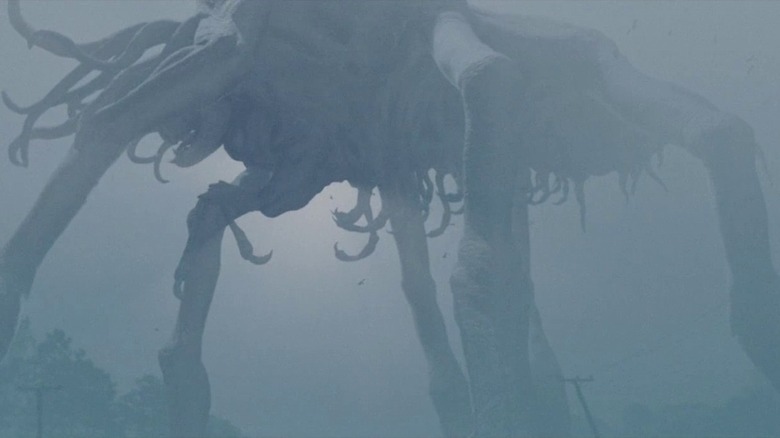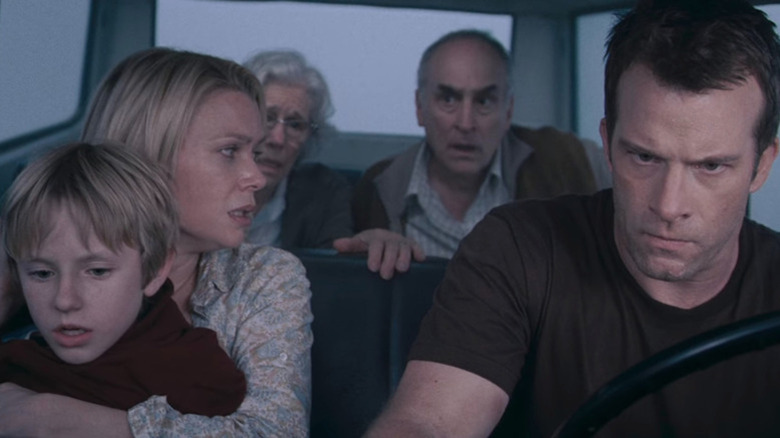Here's The Mist And The Shawshank Redemption Filmmaker Frank Darabont's Advice For Aspiring Writers [Exclusive]
Scads of books have been written on the subject of screenwriting by people who purport to know the tricks of the trade. Some of these folks become industries unto themselves, charging close to $1,000 to attend their intensive, multi-day seminars. Readers and attendees hang on their every word, believing that total adherence to their methods will result in a finished script and a studio deal.
It's a complete sham. All of it.
There are certainly exercises and processes that can help an aspiring writer to be more productive, but the only tried-and-true approach to completing a screenplay is, as Frank Darabont bluntly put it to /Film's Eric Vespe in his fascinating oral history of the filmmaker's "The Mist," to "sit your ass in the chair and do it every day." You can study three-act structure and Joseph Campbell's monomyth all you want, but nothing gets done if you don't sit your tuchus down and do the work. There may be hours or days or even weeks when little to nothing hits the page. Struggling is an essential part of the process, and if you're committed quitting is not an option. Finally, after an indeterminate period of time, you will type "The End" or "Fade Out" on your first draft. And that's where the real work of writing, rewriting, begins.
But don't take it from me, an entertainment journalist with no produced screenplay credits. Listen to Darabont, the writer of "The Shawshank Redemption," "The Green Mile" and, of course, "The Mist."
Darabont's secret screenwriting superpower
In Vespe's oral history, Darabont credits his early success to his "secret superpower" that allowed him to write for 12 to 15 hours a day. "I can't do that anymore," he says. "Even my knees won't take it, let alone my brain, and I have a life now!" He also elaborates on his butt-in-seat work ethic by noting, [D]on't leave unless you have to pee or eat. If you have to eat, do it at home. Don't go out to lunch with friends. Eat and then sit back in the chair again."
When it comes to the first draft, Darabont reassures writers that it doesn't have to come out anywhere near to perfect.
"[M]y first draft always sucks. My first draft of any page of any script, I look at it and it's a mess. As I go along, breaking new ground, I always start every day with revising the previous set of pages. That gets me warmed up. It makes those pages nicer. So as I start to read them, they don't suck so much. They actually start to look pretty good. Just don't feel like you're failing if it's not the end result right off the bat."
A writer writes, always
Darabont is particularly adamant that writers not wait for inspiration. If you only write when you're inspired, you're never going to finish. Per Darabont,
"Stephen King has described his muse as a guy with a buzz cut, wearing overalls, smoking a cigar and saying, 'Get to work, a**hole. You got stuff to do today. Get to it.' And I have to agree with him. If I waited for the airy fairy muse to drop magic fairy dust on me until I'm like, 'Oh boy, I'm going to write something great today," I never would've written anything.'"
It might be a cliche that perspiration equals inspiration, but it's only a cliche because it's true. There are no shortcuts, and writing, especially banging out that first draft, is rarely fun. There is a quote I've seen attributed to everyone from Dorothy Parker to Douglas Adams that nails what the profession is all about: "I hate writing, I love having written." This is a mantra I combine with a simple, yet spot-on observation from Billy Crystal's unhappy writing instructor in "Throw Momma from the Train." "A writer writes, always." Save your money, and keep tap-tap-tapping away.


